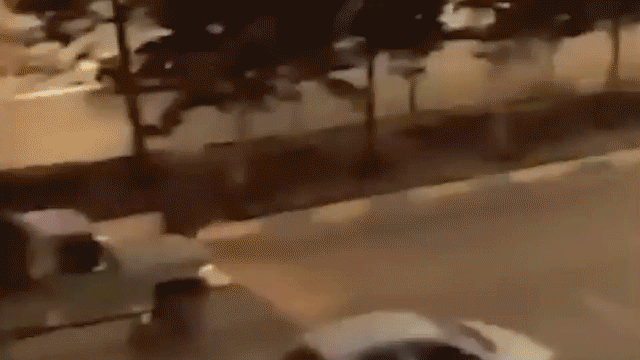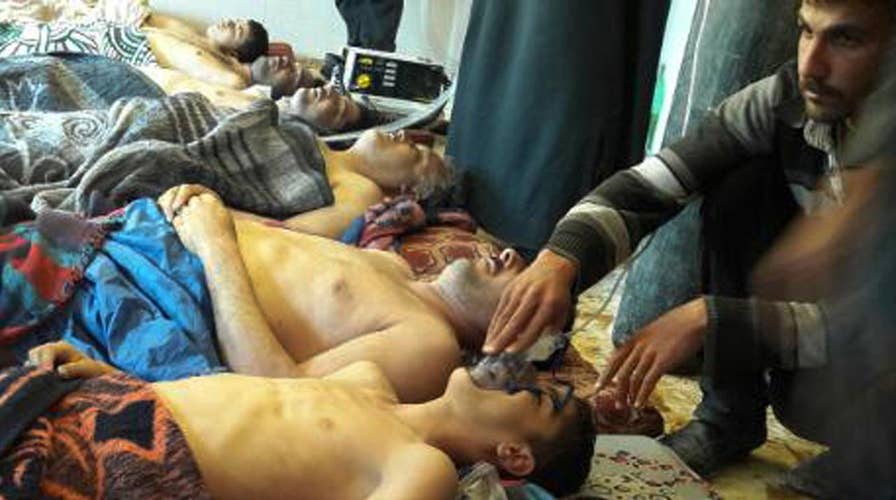Turkey confirms sarin gas was used in Syria chemical attack
Benjamin Hall reports from Antakya, Turkey
For more than six years, Syria has been hacked apart by war. Some combatants fight for freedom, some for jihad, some for the Damascus regime. But whatever the motivation, the upshot is seemingly endless bombing, chemical weapons attacks, suicide explosions, starvation, sieges and displacement. So what is daily life really like for civilians caught in the crossfire?
One case in point is the province of Idlib, close to the Turkish border. The area galvanized world attention last week after chemical bombs were unleashed in the provincial town of Khan Sheikhoun, claiming the lives of almost 100 children and adults and wounding hundreds more.
“There is food and some services here, but people are fleeing to other places,” prominent Syrian journalist Hadi Al Abdullah – who navigates one battle zone to the next – told Fox News.
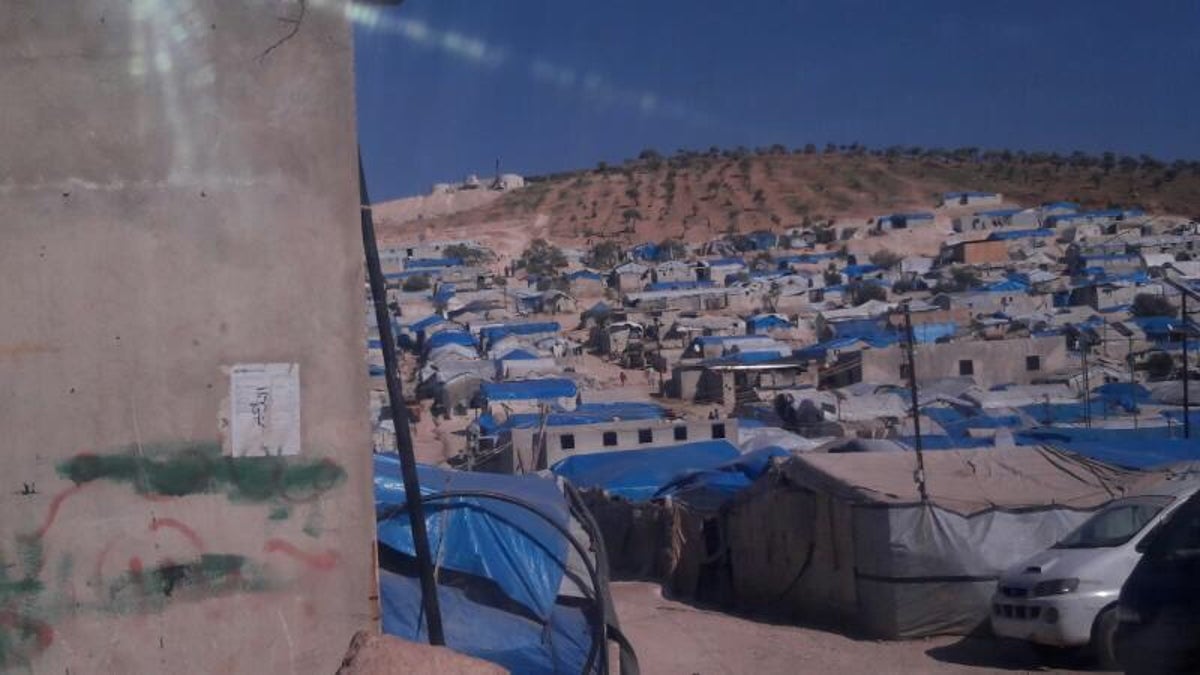
Displacement camp in Idlib province, Syria (FoxNews.com)
While there are non-governmental organizations (NGOs) on the ground administering some food and aid for those left without homes, there are no open cafes and a mere spattering of shared generators for electricity.
“We try to just adapt,” Abdullah continued. “We draw water from the earth, we get some internet from Turkey.”
Things are not much different an hour-and-a-half drive away, in the northwest Idlib village of Aqrabat. Essa Essa, a 27-year-old NGO field projects officer , said that even though his area is safer than most, there is no way to avoid the killing.
“All the time, you will be afraid of aircraft and you don’t know when one will strike. You will be afraid when your children go to play or when they go to school that they won’t come home. You will not be safe in your house, maybe the regime bombed your house,” he explained. “You know that maybe you will die when you walk in the street or go to pray in a mosque. You wonder if you will die when you try to buy something for your children to eat, or your babies won’t wake up or you won’t wake up to see your babies grow up. It’s hard to find work, it’s hard to find medications. People suffer in every way.”
On feature of life in a war zone is the constant effort to simply carry on, adapt and live a normal life.
“They are working, selling, going to pray. They are trying to find materials to reconstruct the buildings, the homes and the hospitals,” Essa lamented. “Some people are lucky to buy food. Some have no money and have to wait for the NGOs.”
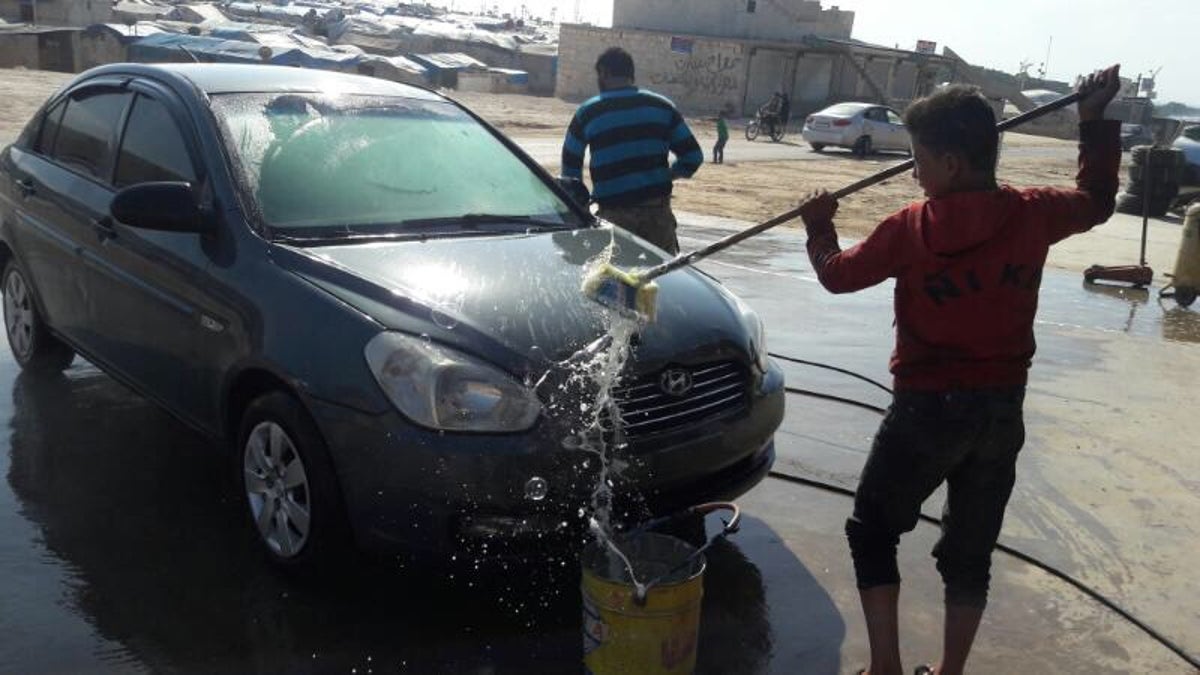
Syrians trying to adapt and live a normal life in opposition-held Idlib, Syria (FoxNews.com)
In 2013, Khalaf Ahmed, 35, escaped to Aqrabat from his hometown of Raqqa – the caliphate “capital” – without even the shoes on his feet, after the jihadists raided his neighborhood and arresting anyone deemed a dissident. Much of his new neighborhood has been flattened by a series of Syrian government airstrikes.
“There is no electricity aside from a little generator. People are displaced and live in little tents. In an attempt to preserve their lives and any little money they may have, there are no parties. I go to work in the morning and come back before sunset,” Ahmed, now a humanitarian worker, said. “I stay in my house at night because there is nothing open. There are some markets during day, but they are targeted by the planes. We know that some days, friends will be lost.”
However, Ahmed insists that he would rather live this impoverished, fear-lurking life under the opposition umbrella then be beholden to President Bashar Assad’s regime.
“I am against ISIS, I want them gone, but I still consider that Assad is the most dangerous,” he noted. “This is organized terror.”
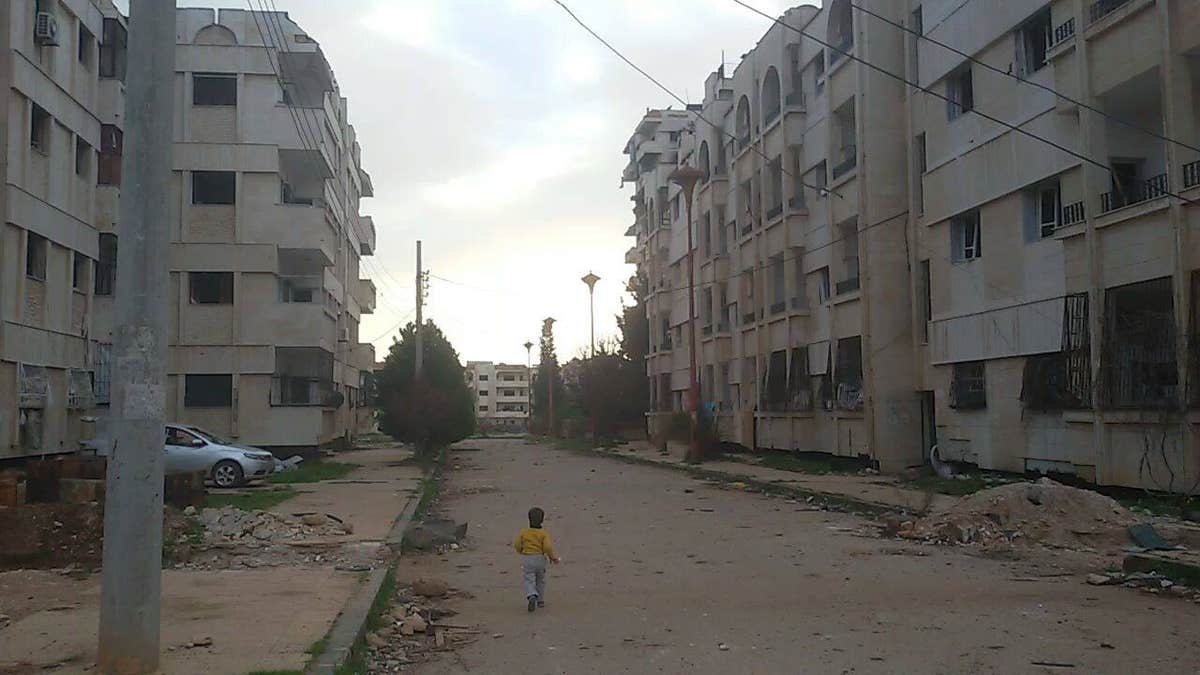
Things are a little better for the U.S.-supported rebels in Syria’s Kurdish-controlled northeast, an area known as Rojava. Even though occupants endure mass casualties and heavy ISIS resistance as Kurdish fighters close in on Raqqa, the putative capital of Islamic State, people living in and around Rojava – in what they soon hope to be an officially recognized autonomous region – is better than any other part of Syria.
“We take in all the refugees from the region. I haven’t seen any homeless or poor people. Everyone is provided with the essentials and an opportunity to work in local cooperatives,” Ozkan Ozdil told Fox News. “Everyone gets along. There is a mutual respect for everyone. A lot of people have joined the local military or everyone protects their own area and polices themselves.”
According to Ozdil, schools have brought back languages that were near extinction. They teach Kurdish in Kurdish areas and also have lesson in Arabic and Assyrian, the language of many of the area’s Christians.
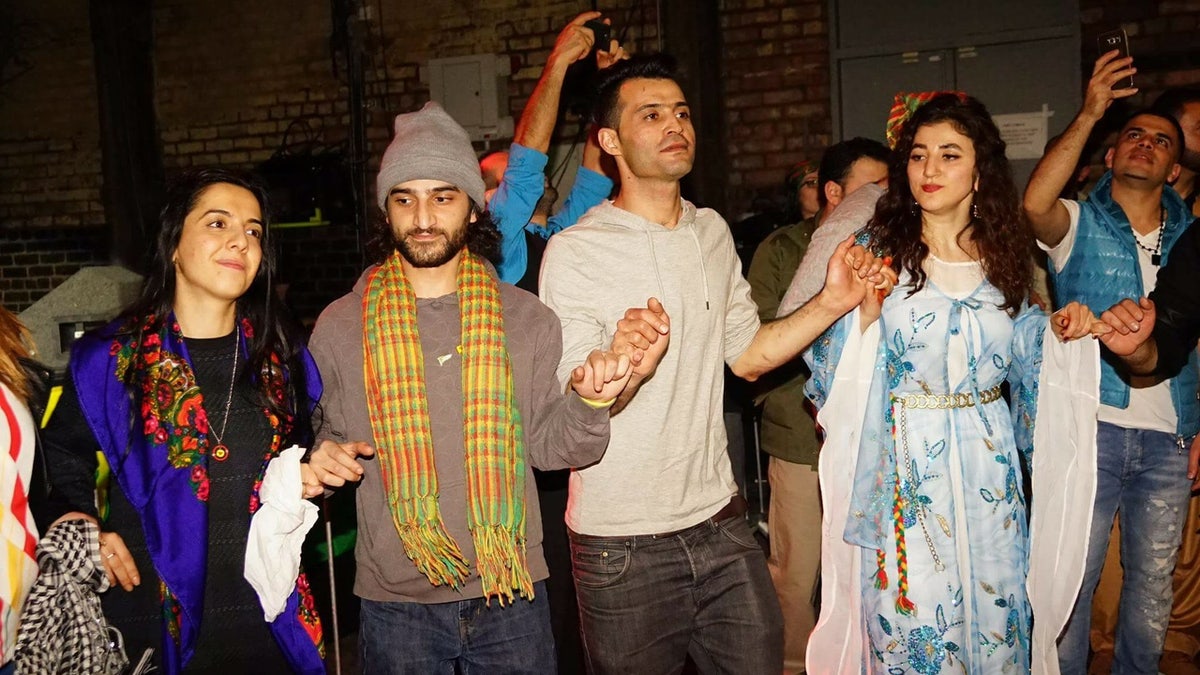
Dancing and entertainment still a key part of life in Syria's Kurdish region
“Many children here have been scared from the war, but within Rojava they have found peace and can live normal lives,” he went on. “They go for ice cream and play in the parks.”
TILLERSON ISSUES ULTIMATUM TO RUSSIA
AFTER MEETING WITH TOP DIPLOMATS AT G7 SUMMIT
SYRIA’S SECRET CAVES SERVE AS HOSPITALS IN A FINAL LIFELINE TO SAVE VICTIMS
Over in the western Syrian city of Homs children don’t go out for ice cream or play in parks. Homs became an opposition stronghold in the early years of the war but fell back into regime hands in late 2015. Parks have become patches of painful memories marked by debris. The landscape is tainted by hollowed-out homes, mortar-scarred buildings and shattered remains.
Over the last couple of weeks, scores have been fleeing the last rebel-held Homs neighborhood of Al Waer. Mouhannad, a husband and father of two toddlers, intends to leave for the Idlib area soon. He was in his third year of veterinary medicine studies when the war broke out, and he never got to graduate. Instead, Mouhannad learned to repair computers for a little spare change and spends most of the day in his small shop and then going home to take care of his family before dark.
“Government militias are located around the neighborhood, but none of them are on the inside,” Mouhannad said. “There are no services, except monthly supplies from the United Nations if the system allows convoys to enter the neighborhood. There is nothing for cleaning the streets, there is no transportation, no vaccines for the children. Sometimes there is school, but it closes when bombing begins.”
Only one service is provided to residents without cost.
“The coffins come for free,” he said. “Because we don’t have enough coffins here.”
Life before the war, the young father reminisces, “was of course prettier.”
“My father owned a gold shop, a clothes shop and a real estate shop. We had a farm, two cars and offices. My family -- six brothers, one sister, father and mother – were all hardworking,” Mouhannad recalled. “With the war, my father was afraid and we had to leave everything and escape.”
Although his two boys were born during the war and know only of war, they are far from immune to the fear and carnage.
“I try to help them by hugging them during the bombing and telling them the planes will not hurt them because they are with me. I made them a battery-operated TV to watch children’s programs over the noise,” he said. “Sometimes, they go outside and play. But sometimes the sniper system can see them, so I hide them. Sometimes I am scared, I take them to work with me so I can see them.”
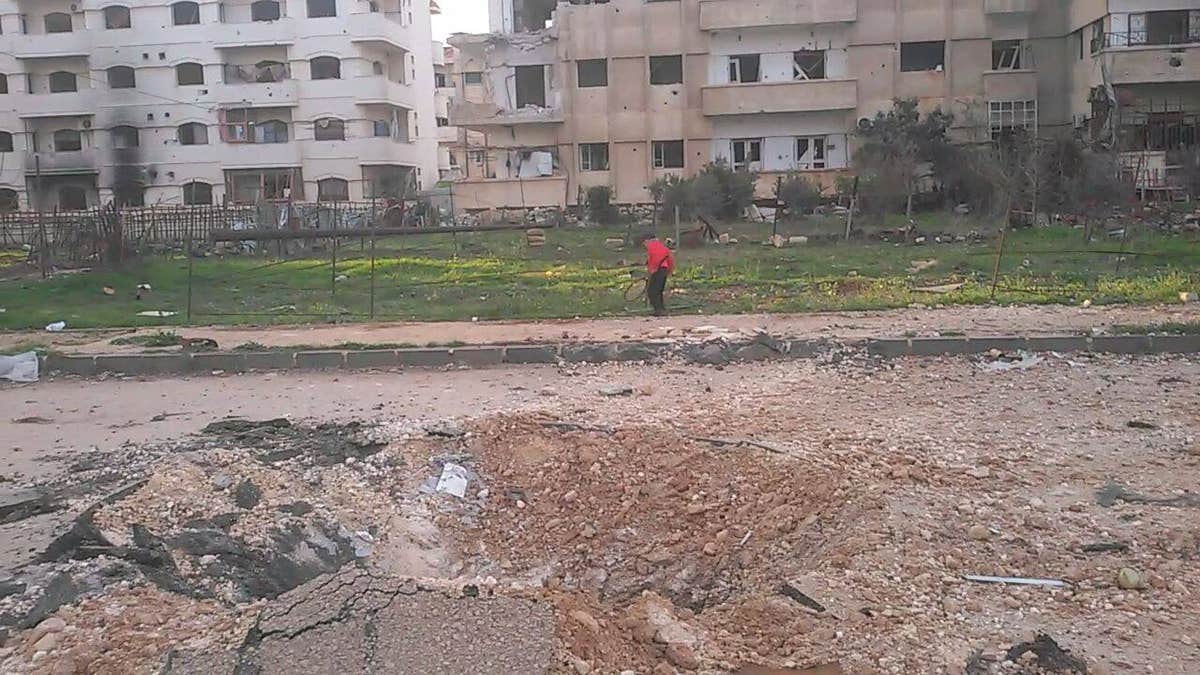
Child plays in remains of a park in Al Waer, Homs in Syria (FoxNews.com)
One hundred miles away on the outskirts of the rebel-gripped Damascus suburb of Douma, residents routinely rise and fall to the whistle of bombs and smoke and bullets blazing the streets. One activist, Omran Abdullah, detailed to Fox News that the people are poor and cannot feed their children due to the high price of goods. Bread and milk are more than four times pre-war prices. There is little variety of fruits, and many medicines no longer exist on pharmacy shelves. He said the Lebanese militia Hezbollah encircles the periphery and controls checkpoints outside.
“But,” Abdullah pointed out. “Our area is released from the regime.”
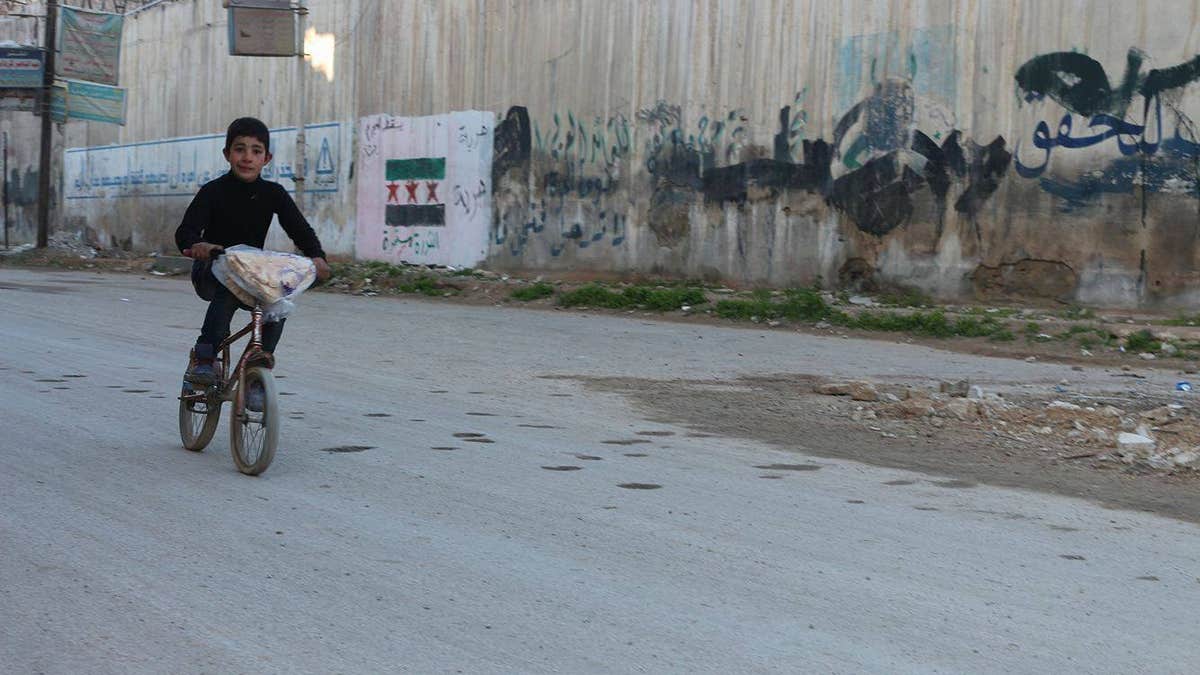
Child rides through the rebel-held streets of the Damascus suburb of Douma, Syria
The only real contrast to life in Khan Sheikhoun, Homs, Aqrabat, Rojava and Douma is found in Damascus, the largely pro-government capital.
The city of 1.7 million bustles even as bombs bloody some parts of the city’s periphery. Urban life is work and plenty of play. Restaurants and coffee shops are alive with students and businessmen alike. There is music and dancing and live entertainment.
Unlike Syrians living outside of Damascus, resident don’t complain of bombing or chemical weapons attacks. They complain about traffic clogged with extra security checkpoints and high costs resulting from the economy-draining conflict and international sanctions.
“Of course we talk about the war, but it has become part of daily life. People are used to it,” said Solomon Sadee, a fiction author and poet. “This is a beautiful city… We here, we too, just want peace.”















